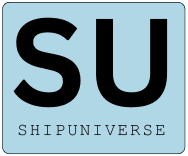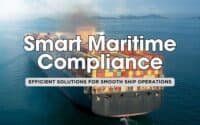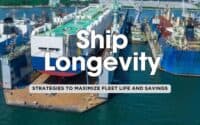Dark Fleets, Dark Consequences: Top 10 Ways Shadow Fleets Impact Us All
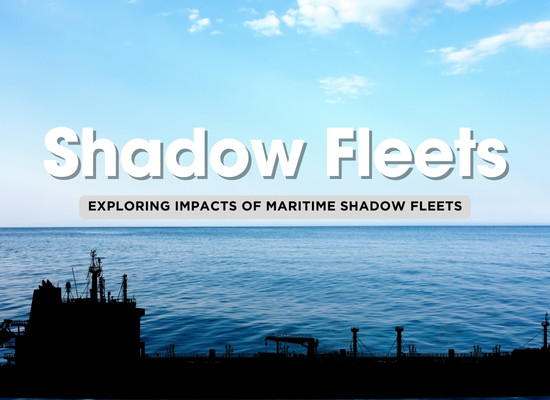
Hidden across international waters, shadow fleets present challenges that ripple through economies, ecosystems, and security frameworks. These ships, operating outside established norms, raise significant concerns for global trade, regulation, and safety. Let’s take a look into the hidden costs of dark fleets and ramifications of this concerning trend.
For the sake of balance, we will also explore the nuances of shadow fleets, including the grey areas and what some consider the potential positives of their existence.
➡️ 1. Top 10 Negative Impacts of Shadow Fleets
➡️ 2. Top 5 Gray/Positive Arguments in Support of Shadow Fleets
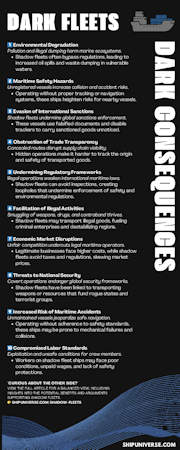
Dark Fleets / Dark Consequences Infographic
An insightful overview of the top 10 global impacts of shadow fleets, highlighting their challenges and consequences for trade, safety, and the environment.
1. Top 10 Negative Impacts of Shadow Fleets

1️⃣ Evasion of International Sanctions 🌍
Sanctions are a powerful tool nations use to influence behavior, penalize violations, and maintain global order. Shadow fleets, however, thrive by sidestepping these measures, creating ripple effects across economies and societies.
- Empowering Sanctioned Entities:
Shadow fleets transport commodities like oil, coal, or arms for nations or organizations under sanctions, providing them with critical revenue streams. This can extend the lifespan of regimes accused of human rights abuses, military aggression, or funding terrorism. - Distorting Legitimate Markets:
By injecting unsanctioned goods into the global market, shadow fleets create price imbalances. For instance, illegal oil shipments can reduce global crude prices, affecting oil-exporting economies and legitimate companies adhering to the rules. - Eroding Diplomatic Leverage:
Sanctions are designed to be a collective effort. When shadow fleets weaken their effectiveness, international diplomacy loses a key mechanism for resolving disputes and maintaining peace.
💥 The Fallout: Shadow fleets not only undermine global accountability but also destabilize markets, prolong conflicts, and weaken nations’ ability to enforce collective decisions for peace and stability.
2️⃣ Obstruction of Global Trade Transparency ⚖️
Global trade relies on transparency to function efficiently. Knowing where goods come from, who owns the vessels transporting them, and whether they comply with regulations are critical elements of a smooth maritime system. Shadow fleets, however, operate in a cloak of secrecy, threatening this transparency.
- Manipulating AIS (Automatic Identification Systems):
Shadow fleets often disable or manipulate AIS trackers, making it difficult to monitor ship movements. This creates blind spots in maritime surveillance and compromises supply chain visibility. - False Documentation and Flags:
These fleets frequently use falsified papers or flags of convenience to disguise their true ownership and origin. This practice hampers efforts to enforce laws, track illicit trade, and ensure compliance. - Delays and Higher Costs for Legitimate Traders:
Shadow fleets’ clandestine activities increase scrutiny at ports, causing delays and stricter inspections for compliant vessels. This adds costs to businesses that rely on transparent and efficient shipping operations.
💥 The Fallout: The loss of transparency in global trade weakens trust in maritime systems, increases costs for lawful businesses, and creates inefficiencies that impact everyone—from ship owners to end consumers.
3️⃣ Undermining Regulatory Frameworks 📜
The global maritime industry relies on an intricate network of regulations enforced by international bodies, national governments, and port authorities. Shadow fleets, however, often exploit loopholes or disregard these frameworks entirely, weakening their effectiveness.
- Dodging Regulatory Oversight:
Shadow fleets often operate under flags of convenience—registering their ships in countries with lax maritime laws. This makes it difficult for authorities to enforce safety, labor, or environmental standards. - Weakening International Collaboration:
Effective regulation relies on cooperation between nations. The existence of shadow fleets exposes weaknesses in global governance, leading to mistrust and reduced willingness to collaborate on enforcing maritime laws. - Creating Enforcement Challenges:
Regulatory bodies, already stretched thin, face increased difficulty identifying and penalizing non-compliant vessels. This diverts resources from other critical issues, such as combating piracy or ensuring safety.
💥 The Fallout: By undermining regulatory frameworks, shadow fleets weaken the very structures that protect maritime trade, creating long-term risks for fair competition, safety, and sustainability.
4️⃣ Facilitation of Illegal Activities ⚖️
Shadow fleets are not just about bypassing rules—they sometimes actively enable illegal activities that undermine global stability and security. Their operations can provide cover for some of the world’s most serious crimes, often with devastating consequences.
- Smuggling Contraband:
Shadow fleets can be used to transport illicit goods, including weapons, narcotics, and counterfeit products. These activities may fuel criminal enterprises and destabilize regions plagued by violence and corruption. - Human Trafficking:
Unscrupulous operators exploit the secrecy of shadow fleets to traffic vulnerable individuals, perpetuating modern slavery and human rights abuses on a global scale. - Environmental Crimes:
Shadow fleets are often linked to illegal dumping of hazardous materials, unregulated fishing, and poaching, causing widespread environmental degradation that impacts coastal communities and marine ecosystems.
💥 The Fallout: Shadow fleets can not only facilitate crimes but also exacerbate global challenges like organized crime, environmental damage, and human suffering, making them a threat to communities and ecosystems worldwide.
5️⃣ Economic Market Disruptions 💹
The clandestine nature of shadow fleets introduces inefficiencies and imbalances in global markets, creating far-reaching consequences for businesses and economies.
- Unfair Competition:
By avoiding compliance costs such as sanctions, taxes, and regulatory fees, shadow fleets offer their services at lower rates. This creates an uneven playing field, where law-abiding businesses struggle to compete. - Price Volatility:
The unauthorized transport of goods, particularly oil and other high-demand commodities, can flood the market, destabilizing global prices. For example, illicit oil trade often drives down prices, impacting oil-exporting nations and reducing revenues for legitimate suppliers. - Investment Deterrence:
The presence of shadow fleets erodes confidence in market integrity, discouraging investment in industries reliant on transparent trade practices. Legitimate operators may face higher costs to prove compliance or mitigate risks.
💥 The Fallout: Economic instability caused by shadow fleets affects businesses, reduces investor confidence, and disrupts global trade, making it harder for compliant companies to thrive.
6️⃣ Environmental Degradation 🌊
Shadow fleets may operate with little regard for environmental regulations, leaving behind a trail of ecological harm that affects marine life, coastal communities, and the global environment.
- Oil Spills and Pollution:
Aging ships in shadow fleets often lack proper maintenance, increasing the risk of accidents and oil spills. These spills devastate marine ecosystems and require costly cleanup efforts. - Illegal Dumping:
Shadow fleets are known for dumping hazardous waste, untreated sewage, and other pollutants into the ocean, harming biodiversity and contaminating waters relied upon by coastal populations. - Unregulated Emissions:
Operating outside regulatory frameworks means many shadow fleet vessels use low-grade fuels, contributing to higher carbon emissions and air pollution, exacerbating global climate challenges.
💥 The Fallout: The environmental damage caused by shadow fleets impacts ecosystems, accelerates climate change, and places an enormous burden on governments and organizations tasked with mitigation and restoration.
7️⃣ Threats to National Security 🛡️
Shadow fleets don’t just evade regulations; they often contribute to activities that undermine national and international security frameworks.
- Transporting Illicit Materials:
Shadow fleets can be used to smuggle weapons, strategic resources, or sensitive technologies to sanctioned states or non-state actors, raising concerns about global stability. - Funding Adversarial Regimes:
By facilitating the trade of sanctioned goods, these fleets can funnel revenue to regimes or organizations that may engage in military aggression or cyber warfare. This creates long-term geopolitical risks. - Undermining Maritime Surveillance:
Shadow fleets may evade tracking systems like AIS (Automatic Identification Systems), creating blind spots in maritime surveillance. This compromises nations’ abilities to monitor and protect their waters effectively.
💥 The Fallout: Shadow fleets pose direct risks to national security, enabling the proliferation of dangerous materials and threatening the safety of maritime boundaries.
8️⃣ Increased Risk of Maritime Accidents ⚓
Operating outside regulatory oversight, shadow fleets often use older vessels and unsafe practices, increasing the likelihood of accidents that can have catastrophic consequences.
- Poor Maintenance Standards:
Many shadow fleet vessels are poorly maintained, making them more prone to mechanical failures, fires, or structural collapses. This endangers crew members and other vessels sharing the same waters. - Navigational Risks:
Shadow fleets often turn off AIS trackers to avoid detection, making it harder for other ships to avoid collisions in busy shipping lanes. This heightens the risk of accidents. - Environmental and Economic Fallout:
Accidents involving shadow fleets—such as oil spills or shipwrecks—can lead to widespread environmental damage and disrupt major shipping routes, causing economic losses.
💥 The Fallout: The increased risk of maritime accidents threatens crew safety, damages ecosystems, and disrupts global shipping, placing an additional burden on rescue and cleanup operations.
9️⃣ Compromised Labor Standards ⚒️
The clandestine nature of shadow fleets often extends to the treatment of their crews, who may face harsh conditions and exploitative practices.
- Exploitation of Workers:
Many shadow fleet operators employ seafarers under conditions that violate international labor laws. This includes low wages, long hours, and unsafe working environments. - Lack of Legal Protections:
Without proper documentation or oversight, crew members on these vessels often lack access to legal recourse, healthcare, or other protections afforded by international labor agreements. - Human Trafficking Risks:
In some cases, shadow fleets may directly engage in human trafficking, transporting vulnerable individuals under inhumane conditions.
💥 The Fallout: Compromised labor standards harm seafarers’ well-being, perpetuate human rights violations, and tarnish the reputation of the maritime industry as a whole.
🔟 Maritime Safety Hazards ⚠️
The unsafe practices and aging vessels of shadow fleets not only endanger their own crews but also pose risks to other ships and infrastructure in shared waters.
- Unsafe Vessel Operations:
Shadow fleets often avoid inspections, meaning their vessels may be operating with outdated equipment, structural weaknesses, or other safety risks. - Threats to Other Ships:
By disabling AIS trackers and avoiding detection, shadow fleets increase the risk of collisions in busy shipping lanes, threatening both lives and cargo. - Damage to Port Infrastructure:
Poorly maintained vessels docking at ports may cause accidents or structural damage, adding costs and risks to port operations.
💥 The Fallout: Maritime safety hazards caused by shadow fleets jeopardize lives, disrupt shipping routes, and strain rescue and emergency response systems.
Shadow fleets are more than just a maritime curiosity; they are a significant concern for global trade, security, and sustainability. While their operations may seem distant to some, their impact is felt across industries, ecosystems, and communities. Addressing the challenges they pose requires collaboration, innovation, and a commitment to enforcing global standards. By shining a light on these hidden threats, the maritime industry can work toward a safer, more transparent future for all.
Table Summary
| ShipUniverse: Dark Fleets’ Global Impacts | |||
|---|---|---|---|
| Impact Area | Description | Affected Parties | Examples |
| Evasion of International Sanctions | Shadow fleets bypass sanctions by disguising ship identities, altering cargo records, and operating under flags of convenience. This allows sanctioned countries or organizations to generate revenue through the illicit trade of oil, weapons, or other restricted goods. Their activities directly undermine global diplomatic efforts to address conflict, terrorism, and human rights violations. |
– Governments enforcing sanctions – Legitimate oil exporters losing market share – International organizations seeking peace and stability |
– Vessels moving sanctioned Iranian oil under fake registrations – Countries like North Korea receiving illicit shipments despite embargoes – Undetected transport of weapons to conflict zones |
| Obstruction of Global Trade Transparency | By disabling AIS trackers, falsifying cargo manifests, and using deceptive ownership structures, shadow fleets create blind spots in global trade. This lack of transparency erodes trust in the shipping industry, disrupts supply chain visibility, and makes it harder for regulators and businesses to trace goods back to their sources. |
– Shippers relying on accurate trade data – Businesses needing transparency for supply chain management – Port authorities tasked with cargo inspections |
– Ships transferring oil ship-to-ship in international waters – Goods falsely labeled to hide their true origins – Ports receiving incomplete or inaccurate cargo documentation |
| Undermining Regulatory Frameworks | Shadow fleets exploit weak enforcement and inconsistencies in international maritime regulations. They register under flags of convenience in countries with lax rules, avoid inspections, and ignore global standards for labor, safety, and environmental compliance. This erodes the integrity of regulatory systems designed to ensure fair and safe maritime practices. |
– International regulatory bodies like IMO – Law-abiding ship owners following strict standards – Nations enforcing environmental and labor protections |
– Ships registered in countries with weak enforcement (e.g., Panama, Liberia) – Non-compliant vessels operating in environmentally sensitive zones – Avoidance of regular safety inspections |
| Facilitation of Illegal Activities | Shadow fleets are a vital tool for smuggling contraband, including weapons, drugs, and counterfeit goods. Their anonymity and untraceable operations also make them ideal for trafficking humans and illegally dumping hazardous waste. These activities often fund organized crime, destabilize regions, and harm vulnerable communities. |
– Law enforcement agencies combating smuggling – Coastal communities impacted by illegal dumping – Victims of human trafficking and related crimes |
– Smuggling arms to conflict zones – Dumping toxic waste into international waters – Transporting counterfeit goods to evade customs |
| Economic Market Disruptions | By flooding markets with illicit goods, shadow fleets create price distortions and unfair competition. Legitimate traders face declining revenues as they compete with lower-cost illegal operators. Furthermore, this volatility discourages investment and reduces confidence in key industries like oil, seafood, and consumer goods. |
– Legitimate exporters harmed by price suppression – Investors wary of unpredictable market conditions – Industries reliant on transparent trade practices |
– Illegal crude oil reducing global prices – Disruption in fisheries due to unregulated catches – Underpricing of counterfeit products in retail markets |
| Environmental Degradation | Shadow fleets frequently disregard environmental regulations, leading to significant harm to marine ecosystems. Unregulated ships often emit higher levels of pollution, dump hazardous waste, and contribute to oil spills. These actions disrupt biodiversity, harm coastal economies reliant on marine resources, and accelerate climate challenges. |
– Coastal communities dependent on fishing – Governments tasked with environmental protection – Marine life and ecosystems at risk |
– Oil spills from poorly maintained vessels – Illegal disposal of toxic waste at sea – Unregulated emissions from low-grade fuels |
| Threats to National Security | Shadow fleets play a role in undermining national security by transporting illicit materials such as weapons or dual-use goods. Their activities often bypass surveillance systems, creating blind spots in maritime security. This facilitates arms proliferation and contributes to regional instability. |
– Defense and intelligence agencies – Nations combating arms trafficking – Regions vulnerable to conflict escalation |
– Undetected shipments of arms to conflict zones – Illicit goods supporting adversarial regimes – Disruption of coastal surveillance systems |
| Increased Risk of Maritime Accidents | Operating outside regulatory oversight, shadow fleets often consist of older or poorly maintained vessels. Their disabling of AIS systems creates navigational hazards in busy shipping lanes. This increases the likelihood of collisions, oil spills, and other maritime accidents that have both economic and environmental costs. |
– Shipping companies sharing busy routes – Rescue and cleanup agencies – Port authorities and infrastructure |
– Collisions due to AIS manipulation – Groundings caused by outdated navigation equipment – Oil spills from damaged tankers |
| Compromised Labor Standards | Crews aboard shadow fleet vessels often face unsafe and exploitative working conditions. Without oversight, these ships may disregard international labor laws, subjecting seafarers to long hours, low pay, and substandard living conditions. In extreme cases, some vessels engage in human trafficking or forced labor. |
– Seafarers employed on these vessels – International labor organizations – Families and communities of exploited workers |
– Lack of medical care for injured crew members – Non-payment of wages to seafarers – Forced labor on fishing vessels |
| Maritime Safety Hazards | Shadow fleets’ evasion of safety inspections and regulatory oversight increases the risks of onboard fires, mechanical failures, and structural collapses. Their presence in shared waterways endangers not only their own crews but also the broader maritime community, including compliant vessels and port workers. |
– Seafarers aboard shadow fleet vessels – Crews of compliant ships – Port infrastructure and rescue services |
– Fires caused by faulty engines – Vessel capsizing due to overloading – Accidents at port during loading or unloading |
2. Top 5 Gray/Positive Arguments in Support of Shadow Fleets
While shadow fleets often operate in defiance of established regulations and pose significant challenges to global systems, some argue that their existence serves certain practical, economic, or even humanitarian purposes. These perspectives do not erase the concerns but provide a more nuanced understanding of the motivations and potential benefits behind shadow fleet operations. Let’s delve into five key arguments in support of shadow fleets.



1️⃣ Maintaining Essential Supply Chains 🌍
Proponents argue that shadow fleets help maintain critical supply chains in regions where sanctions or geopolitical restrictions have disrupted access to essential goods.
- Preventing Economic Collapse:
In sanctioned nations, shadow fleets provide a means for economies to survive by transporting vital resources like oil, food, or medical supplies. Without these clandestine operations, entire populations could face shortages or humanitarian crises. - Supporting Energy-Dependent Economies:
For many countries reliant on oil imports, shadow fleets offer a way to secure energy supplies when access to legal trade is limited due to geopolitical tensions. This can prevent widespread energy insecurity and economic instability. - Providing a Lifeline for Vulnerable Communities:
Beyond governments, shadow fleets can indirectly benefit marginalized or vulnerable communities by keeping essential goods flowing, even in the face of restrictions.
💡 Perspective: While these operations challenge international norms, their role in maintaining supply chains during crises highlights the complexity of enforcing sanctions and trade restrictions.
2️⃣ Economic Flexibility for Developing Nations 📈
Shadow fleets can offer economic opportunities for developing nations, particularly those with limited resources or strained economies.
- Leveraging Flags of Convenience:
Many developing nations allow shadow fleets to register under their flag as a source of revenue. The registration fees and associated services can provide financial support for struggling economies. - Affordable Shipping Options:
Shadow fleets often operate at lower costs than compliant shipping lines, enabling smaller or less wealthy nations to access shipping services that they might otherwise not afford. - Creating Employment Opportunities:
Shadow fleet operations, while controversial, still create jobs in shipping, logistics, and related industries in regions that depend on maritime trade for employment.
💡 Perspective: While these economic benefits come with ethical and regulatory challenges, they underscore the importance of considering the needs of developing nations in global trade policies.
3️⃣ Circumventing Political Gridlock 🏛️
In situations where political disagreements or sanctions disrupt global trade, shadow fleets can act as a workaround to restore some balance.
- Bypassing Unilateral Sanctions:
Not all countries agree with sanctions imposed by certain global powers. Shadow fleets allow countries to continue trade relationships that they see as mutually beneficial, even if these violate the terms of international agreements. - Avoiding Overdependence on Major Economies:
Developing or smaller economies may use shadow fleets to reduce their reliance on major trading partners, fostering a more diversified and resilient economic landscape. - Preserving Neutrality in Conflicts:
Shadow fleets can help countries avoid being drawn into conflicts by quietly facilitating trade, especially in contested regions or during embargoes.
💡 Perspective: While controversial, shadow fleets’ role in circumventing political impasses highlights the tension between global governance and national sovereignty.
4️⃣ Supporting Humanitarian Efforts 🤝
Despite their clandestine nature, shadow fleets sometimes serve humanitarian purposes, especially in crisis zones where formal channels are inaccessible.
- Delivering Aid in Conflict Zones:
In regions affected by war or political instability, shadow fleets may transport food, medical supplies, or other essentials when traditional supply lines are blocked. - Reaching Sanctioned Populations:
Sanctions often hurt ordinary citizens more than governments. Shadow fleets enable the flow of goods to populations that might otherwise face severe hardships, such as energy shortages or famine. - Providing Critical Infrastructure Materials:
In some cases, shadow fleets deliver materials like construction supplies to rebuild infrastructure in disaster-stricken areas where formal trade routes have been cut off.
💡 Perspective: Though often outside legal frameworks, these operations can fill humanitarian gaps left by rigid international policies.
5️⃣ Enabling Global Trade Resilience 🌐
In an increasingly interconnected world, shadow fleets provide flexibility to global trade systems during times of disruption.
- Preventing Supply Chain Collapse:
During global crises like pandemics or natural disasters, shadow fleets can keep goods moving when traditional routes or compliant operators face significant delays or barriers. - Meeting Excess Demand:
Shadow fleets often step in to transport goods when there’s a sudden surge in demand that compliant fleets cannot accommodate, such as during a fuel crisis or grain shortage. - Allowing Experimental Trade Models:
Some argue that shadow fleets create space for innovative or unconventional trade practices, which can reveal inefficiencies in existing systems and drive future reforms.
💡 Perspective: While operating in legal grey zones, shadow fleets contribute to global trade resilience in times of crisis, offering insights into how supply chains can adapt under pressure.
Table Summary
| ShipUniverse: Exploring the Grey Areas of Shadow Fleets | |||
|---|---|---|---|
| Argument | Description | Who Benefits | Examples |
| Maintaining Essential Supply Chains | Shadow fleets help sustain the flow of vital goods, such as oil, food, and medicine, to regions under sanctions or experiencing trade restrictions. This can prevent humanitarian crises and economic collapse by providing critical supplies to those who need them. |
– Populations in sanctioned nations – Economies dependent on imported energy – Vulnerable communities facing shortages |
– Delivering oil to energy-starved regions – Transporting medical supplies during crises – Maintaining food supplies to embargoed nations |
| Economic Flexibility for Developing Nations | Shadow fleets provide low-cost shipping options and a source of revenue for countries allowing flag registrations. These operations create economic opportunities for nations with limited access to international trade systems or strained economies. |
– Developing nations hosting flag registrations – Small economies accessing affordable shipping – Local workers employed in shipping-related roles |
– Flag registrations in countries like Liberia or Panama – Cost-efficient transport of goods for small importers – Employment generated in maritime hubs |
| Circumventing Political Gridlock | Shadow fleets allow nations to bypass sanctions or trade barriers that they view as unfair or politically motivated. This flexibility can support neutral positions in conflicts and reduce overdependence on major economies. |
– Nations opposing unilateral sanctions – Economies diversifying trading partners – Regions seeking to remain neutral in conflicts |
– Continued trade with sanctioned countries – Securing resources without relying on dominant economies – Avoiding involvement in geopolitical disputes |
| Supporting Humanitarian Efforts | Shadow fleets can deliver aid and essential goods to regions cut off by conflict, sanctions, or natural disasters. Their operations often fill gaps left by traditional supply chains, ensuring that critical resources reach affected populations. |
– Conflict-affected regions – Populations under embargoes – Disaster-stricken areas needing supplies |
– Transporting food to famine-stricken regions – Delivering medical aid in war zones – Providing building materials for disaster recovery |
| Enabling Global Trade Resilience | Shadow fleets provide flexibility during global disruptions, such as natural disasters or pandemics, by stepping in where traditional shipping routes fail. They can also address excess demand, preventing critical shortages in global supply chains. |
– Businesses requiring urgent shipments – Economies facing supply chain bottlenecks – Industries with fluctuating demand |
– Maintaining energy supplies during fuel crises – Transporting goods during pandemic-related delays – Addressing grain shortages in famine-stricken areas |
Additional References
- International Maritime Organization (IMO)
- URL: https://www.imo.org
- Description: The IMO is a United Nations specialized agency responsible for regulating global shipping. It establishes standards for safety, environmental protection, and maritime security, including efforts to combat illegal shipping practices such as those involving shadow fleets.
- United Nations Security Council (UNSC)
- URL: https://www.un.org/securitycouncil
- Description: The UNSC oversees sanctions regimes and enforces compliance to prevent illicit trade and activities that threaten international peace and security. Shadow fleets are often implicated in evading sanctions imposed by the UNSC.
- European Maritime Safety Agency (EMSA)
- URL: https://www.emsa.europa.eu
- Description: EMSA supports EU member states in implementing maritime safety, environmental regulations, and monitoring ship tracking systems. It plays a role in identifying and addressing risks posed by shadow fleets operating within EU waters.
- United States Office of Foreign Assets Control (OFAC)
- URL: https://home.treasury.gov/
- Description: OFAC enforces economic and trade sanctions to protect U.S. national security. Shadow fleets often attempt to circumvent these sanctions, and OFAC monitors and penalizes entities involved in such activities.
- International Chamber of Shipping (ICS)
- URL: https://www.ics-shipping.org
- Description: ICS is a leading trade association for shipowners, promoting safe, secure, and sustainable shipping. It provides guidance on regulatory compliance and advocates for measures to address illegal practices, including shadow fleet operations.


Do you have a Maritime Product or Service that may be of interest to Shipowners? Tell us about it here!
Do you have feedback or insights? Please reach out to editor @ shipuniverse.com
